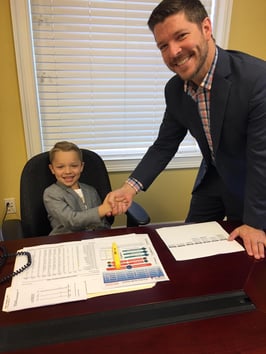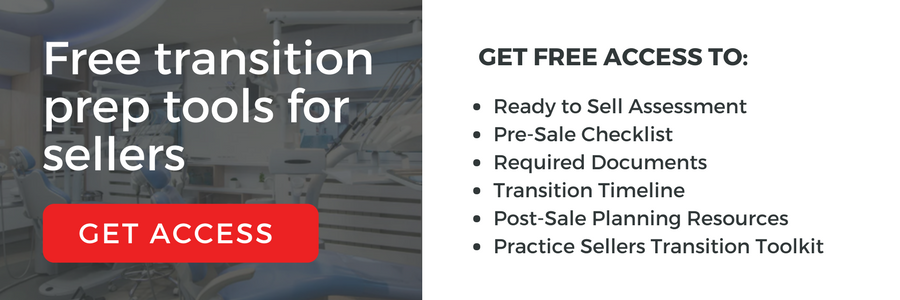There are few tasks in a doctor’s professional career that are as daunting as transitioning out of a practice. Regardless of why a doctor finds themselves in the midst of a practice transition, whether it is to relocate, simplify life, or finally make that step into retirement, it is important to get it right the first time. The average doctor will not have the luxury of learning as they go, most will only experience one practice transition in their professional career. So, what are the common traits that help to make a practice transition smooth, less stressful, and ultimately more successful?

There are certain common traits that tend to be present in what many would deem a “successful” transitions. Perhaps the first step is to define what is a successful transition. To many doctors, a successful transition is one that accomplishes the ultimate goal, that of transferring ownership from the selling doctor to the purchasing doctor. However, much more is happening behind the scenes of a “successful transition”. Good communication, low stress level throughout the process, effective negotiations, continued good rapport among the parties involved, effective closing date, proper introduction of staff to the new owner, complete transfer of goodwill and patients to the new owner, proper handling of accounts receivable and patient credit balances, work in process, and minimal issues after closing just to name a few. To those professionals working in the dental industry, all these things together are what make a successful transition.
What does all this mean for the individual doctor, looking to transition out of their practice and survive to tell the tale? It simply means there is a lot to do, but there are two common traits that the seller can apply that will greatly increase the chances of a successful practice transition.
Keep An Eye on Timeliness.
In a practice transition there are many influencing factors that may push or change a timeline that has been developed for the transition. Negotiations can drag on, financing can take longer than expected, and the parties may fail to be motivated. These things, although not completely in the control of the seller, can be damaging to the transition. A very wise saying in the transition industry is “time kills all deals”, and as simple as it sounds, it is absolute in its accuracy. When two parties initially meet with interest in pursuing a practice transition, there is a spark of energy and excitement. That energy will only continue for a certain period of time, and once it is gone it is quickly followed by frustration. Frustration goes directly against a successful transition as it begins to erode the rapport among the parties and causes secondary issues throughout the process.
The best course of action for a seller is to require a firm closing date upon the receipt of an offer and to express to the parties involved that the closing date contemplated is a deal point. By doing this, the purchaser and their advisors are put on notice that there is a timeline that demands adherence. The effect of the firm timeline is the ability to keep all the interested parties motivated. It will prevent the purchaser from engaging in endless due diligence, shopping bank rates, and will prevent unnecessary delays with advisors working within the deal. Although a firm timeline seems simple, it is more complicated in its application. There are often unavoidable delays that will push a closing date, no matter how firm, but if pursued from the beginning of the process, it is rare to see the transition fall into the cycle of endless delays. Be certain, a rigid timeline is the friend of all parties involved.
Utilize Experienced Advisors.
No doubt this sounds like common sense, but often parties attempt to do the leg work themselves or to lean on inexperienced professional friends or relatives to help. The dental industry has many other industries that work alongside it, to help its members be more successful in their professional practice. A practice transition is one of the most important scenarios where finding the right advisor can be a make or break. In many transitions that find themselves becoming more difficult, tedious, or even ultimately fail, there is often the common trait of inexperienced advisors. A seller can avoid the nightmare scenario of a failed practice transition by surrounding themselves with an experienced team. For many, that team includes a dental specific attorney that is well versed in dental practice transitions, a dental CPA that works with many dental practices and is experienced in acquisitions and transitions, and lastly a dental practice broker that has a proven track record of being a deal maker and not a deal breaker.
The real advantage is having advisors who know where to push and where to give. For example, a dental attorney will know what points in the contract are standard for a practice transition, and will know how to efficiently negotiate the key deal points. An experienced dental attorney is not going to ask for endless revisions to pad a bill; they are going to get in and get out, and by doing so help to preserve the relationship among the parties. The experienced dental CPA will be able to accurately gage the tax ramifications of a practice sale, suggest purchase price allocations that are advantageous to the seller, and ensure monies received at closing are handled properly. Failure to accurately allocate the purchase price can cost the seller thousands of dollars in taxes. The dental broker often acts as the conductor for all the parties involved. The experience of hundreds of dental practice sales, gives the dental broker a keen sense of when to say yes and when to say no, all the while advancing the transition along its established timeline. An experienced broker will work closely with the attorney and CPA to craft a unique transition plan, that keeps the seller’s involvement to a minimum, protects the relationship of the parties, and drastically lessens the chance of a failed transition. It is important to keep in mind that ideally both parties, the seller and the purchaser, will surround themselves with a knowledgeable team, but one party having advisors involved is better than none. Having a professional experienced tear is the best investment the seller can make in their transition.
Practice transitions all start out with the hope of becoming a successful practice transition. However, inexperience often becomes an obstacle to the desired result. A seller keeping in mind two simple facts, the importance of timeliness and the need for experienced advisors, will drastically improve the probability of obtaining a successful transition. In the face of an impending practice transition, these are two investments that a seller should make in themselves and their practice so their transition can become yet another success story.

 980.283.7355
980.283.7355













Comment